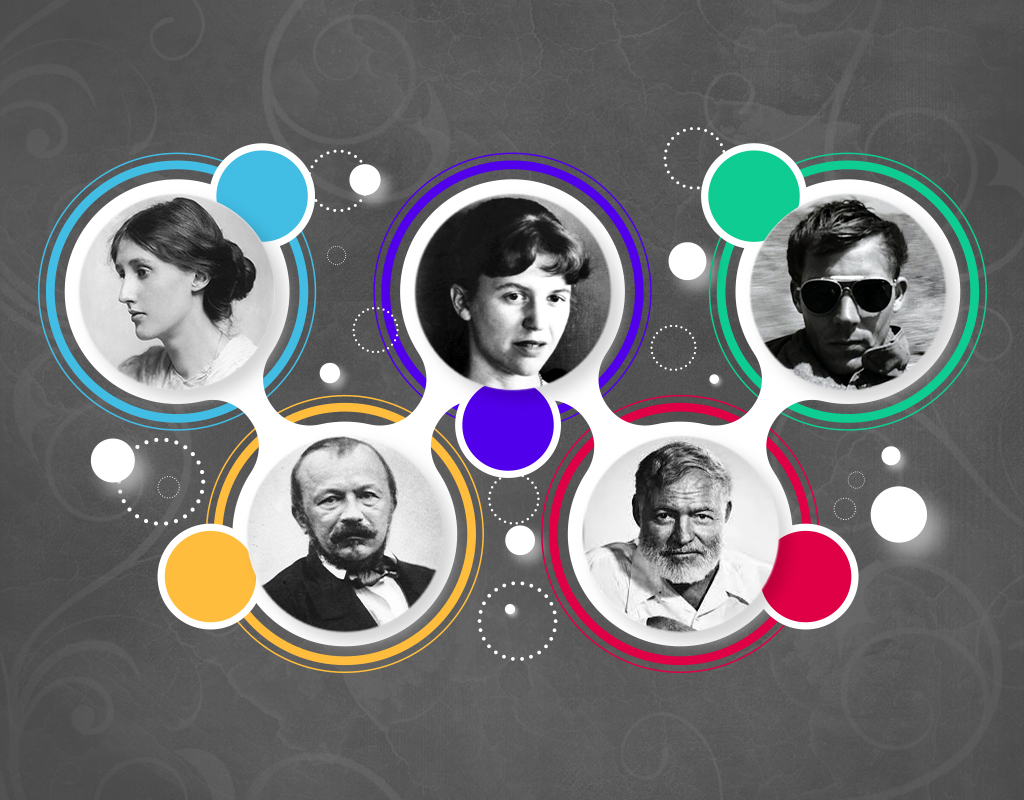5 Literary Figures Who Took their Own Lives
Artists interpret the world for us, but unfortunately, interpreting artists is difficult. They see more than us and feel more than us; therefore, they suffer more than us. Many famous literary personalities have taken their own lives, mostly due to mental health issues. This shows that celebrities face depression, anxiety, panic attacks, and other problems. Sometimes art is not enough to escape from these issues. They need to be taken care of before it is too late. Here are some of history’s most famous suicides:
- Virginia Woolf: One of the most influential modernist writers, Virginia Woolf, took her own life at the age of fifty-nine. She lost her mother when she was thirteen, her half-sister at fifteen, and her father when she was twenty-two. The insecurities and neuroses that she had been suffering from since her early childhood got worse with her mother’s demise. Her works, such as Mrs. Dalloway, A Room of One’s Own, and To the Lighthouse, etc., reflect her artistic genius and the fact that she belonged to the upper crust. Yet her dysfunctional family and abusive brothers took her to the breaking point. On her suicide note, she wrote, “Dearest, I feel certain that I am going mad again. I feel we can’t go through another of those terrible times. And I shan’t recover this time. I begin to hear voices, and I can’t concentrate. So I am doing what seems the best thing to do. You have given me the greatest possible happiness.”
- Sylvia Plath: “I want to kill myself, to escape from responsibility, to crawl back abjectly into the womb,” she wrote in her journals,” wrote Plath in her journal. She was a troubled child; her relationship with her father was complicated, and we felt that properly when we read her poem ‘Daddy’. Since childhood, words have been her defense mechanism. She had ambition right from the start; she used to get depressed when her writings were rejected. Her diaries and poems suggest she was neurotic and had difficulties coming to terms with reality. Later she got married to Ted Hughes, but his adultery made her mental health even worse than before. On a somber winter, Plath gassed herself in her kitchen.
- Ernest Hemingway: Nobel Prize-winning author Ernest Hemingway was a fan of bullfights, hunting, and sailing. It is hard to believe that this person killed himself. It was maybe because he was fighting demons inside or his family had a record of suicides. His father, siblings, and later his granddaughter all committed suicide. Moreover, his physical condition was not good either. He had suffered from malaria, dysentery, and skin cancer and had six serious concussions, which caused headaches, mental fogginess, and severe brain trauma. His death has got to be history’s most famous suicide. Apart from these, there was depression, delusion, and paranoia. At the age of sixty-one, he killed himself by shooting in the mouth with a shotgun.
- Hunter S. Thompson: The legendary inventor of gonzo journalism killed himself in the same way Hemingway did. Thompson’s most famous work, Fear and Loathing in Las Vegas, is the account of his drug-laced adventures in the city in 1972. This later became a film in which Thompson was portrayed by the one and only Johnny Depp. There are conspiracy theories concerning his suicide. Some say he was actually murdered, but the fact is that he was having physical health problems, which was taking a toll on his mental health too. His wife Anita was on the phone with him when he took his life.
- Gerard de Nerval: Gerard de Nerval was a romantic who could not be with the woman he loved; Jenny Colon married someone else and died soon after. Throughout his life, he suffered from mental breakdowns, and he even got institutionalized. The battle against poverty and his fragmented mind became too much to handle, and eventually, he killed himself on January 26.
Having good mental health is one of the key factors of a healthy life. These famous authors have shown that no matter how brilliant or famous one is, it is never enough to keep going. Therefore, write your heart out, pour yourself in the pages, and publish and print your own book but never make this your defense mechanism. See a professional when you feel troubled; there is always a way. Just remember what J. K Rowling said, “Happiness can be found even in the darkest of times if one only remembers to turn on the light.”

